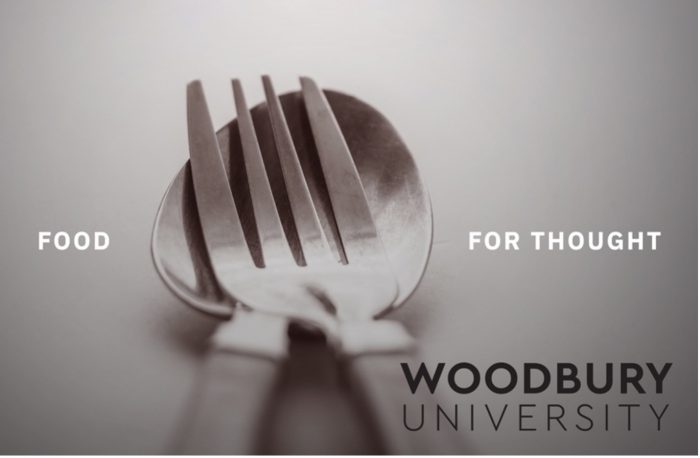College of Liberal Arts Spearheads Effort to Address Food Insecurity on Campus
 This Spring 2022 Woodbury University took a major step toward eradicating food insecurity among students on campus.
This Spring 2022 Woodbury University took a major step toward eradicating food insecurity among students on campus.
The program, called Food for Thought, is made possible by a Global Hunger Foundation Grant to the College of Liberal Arts. Program implementation is a joint effort by stakeholders across the university, with leadership by Dr. Richard Matzen (Professional Writing, CoLA), Shannon Savage (Student Affairs), Natalie Avalos (HR), Philip Haskins (Bon Appétit), and members of the Healthy and Sustainable Campus Committee. The initiative points to the university’s efforts to make corrective steps to adjudicate hunger on both campuses, and to recognize that hunger has a cumulative negative effect in all areas of a student’s life. A hungry student has trouble concentrating, studying and thus ultimately meeting their graduation goals.
The Food for Thought program is the achievement of two separate initiatives that came together through happenstance. Last year, Erik Alfaro, a professional writing student, was working on a project that included a food insecurity survey sent to all Woodbury undergraduates. 309 students took the survey and 70% indicated they struggled with hunger. This equaled about 1/3 of Woodbury’s student population.
Erik’s survey alerted Dr. Matzen to the extent to which Woodbury students experience food insecurity. Woodbury’s Grant Group, convened by Dr. Matzen to connect grant-giving organizations to the University’s programs—a group that includes deans from the Schools and College as well as President Steele—identified the need to address student hunger as a primary goal, but had yet to identify resources to support an initiative.
Enter the Global Hunger Foundation. A number of years ago, the Global Hunger Foundation made a donation to the College of Liberal Arts to address any hunger insecurity issues that might arise. Dr. Eric Schockman, CoLA faculty and Director of the Global Hunger Foundation, worked with the Grant Group to earmark $10,000 in funds. With that seed money in place, the Food for Thought program piloted the program this spring. The Grant Group is now working to identify funds to continue the program and extend support to also assist students with textbook, technology, and transportation costs.
At the heart of the Food for Thought program is a guarantee that students experiencing food insecurity can get help anonymously and easily, removing as many barriers as possible. The process is simple. This spring, an email was sent out with a short application. Students who wanted to take part in the program simply provided their name, email, student ID number, and indicated how long they’ve experienced food insecurity. Students who are on campus at our Burbank location receive a meal plan on their student ID; they then swipe their ID card at Woody’s to receive free meals. Students attending remotely or located at our San Diego campus receive a Kroger gift card.
All the people working on the Food for Thought program understand that it takes a lot to come forward and ask for help, even anonymously. “We don’t know all the circumstances,” Dr. Schockman says, “all we know is they’re hungry. This program gives students the opportunity for students to have some of their needs met without feeling stigmatized.”
The application will be sent out again at the beginning of the fall term so more students have an opportunity to participate. If you want to know more about the program before then, please contact Dr. Richard Matzen ([email protected]) or Shannon Savage ([email protected]).
Last Updated on May 6, 2022.